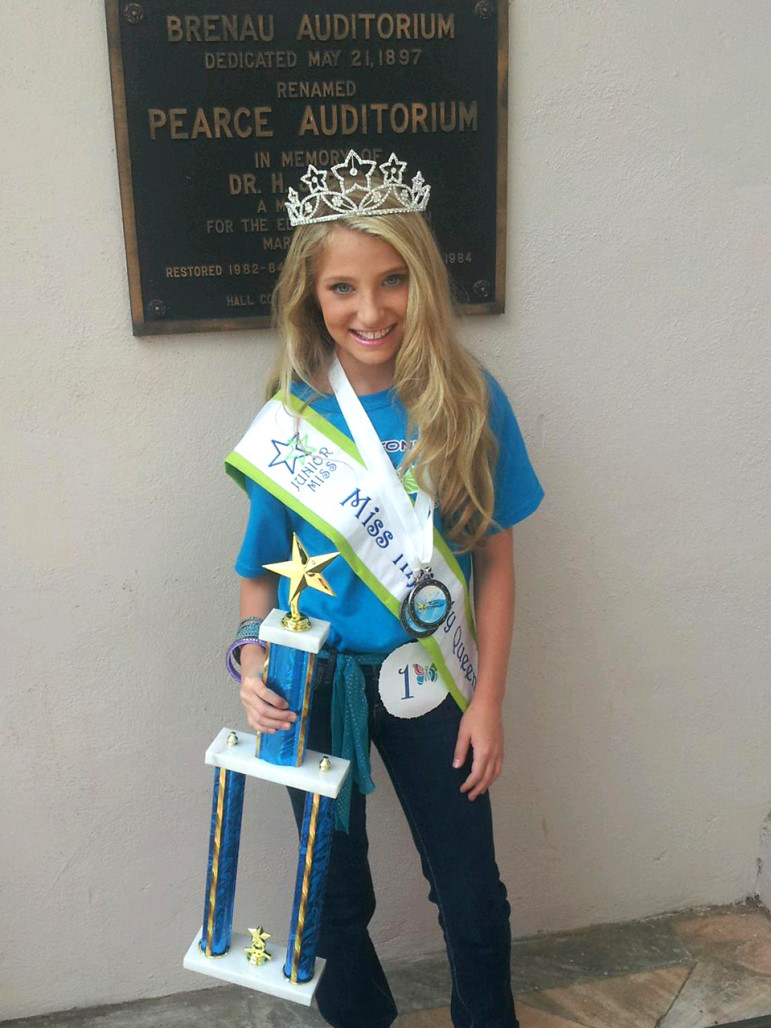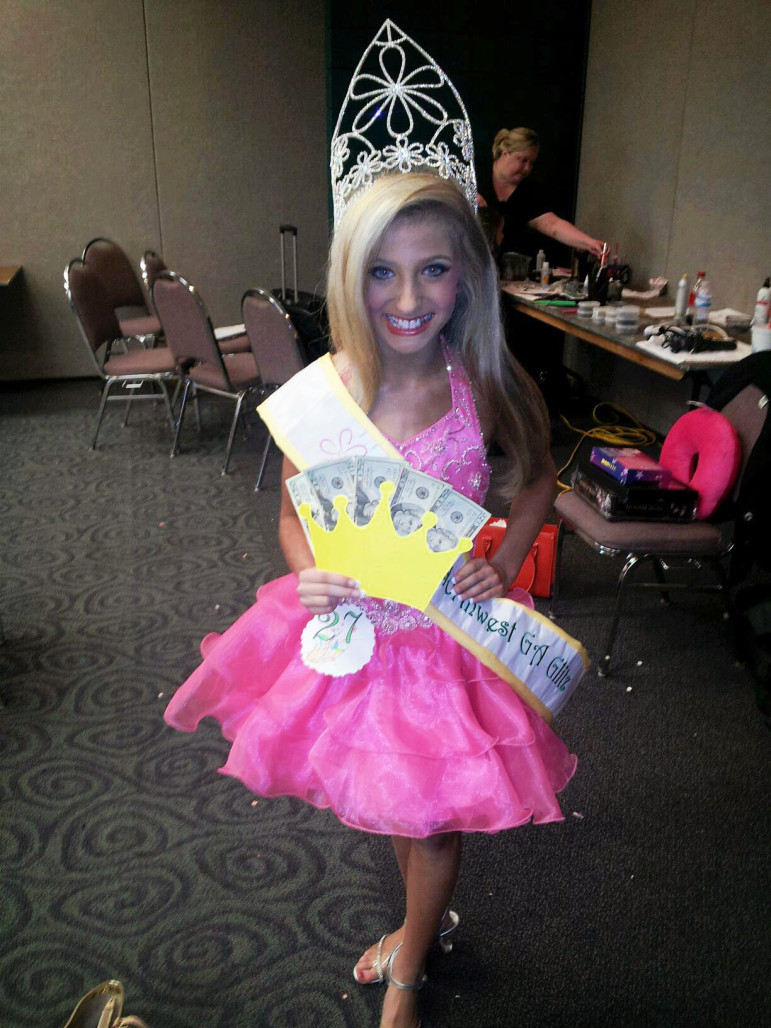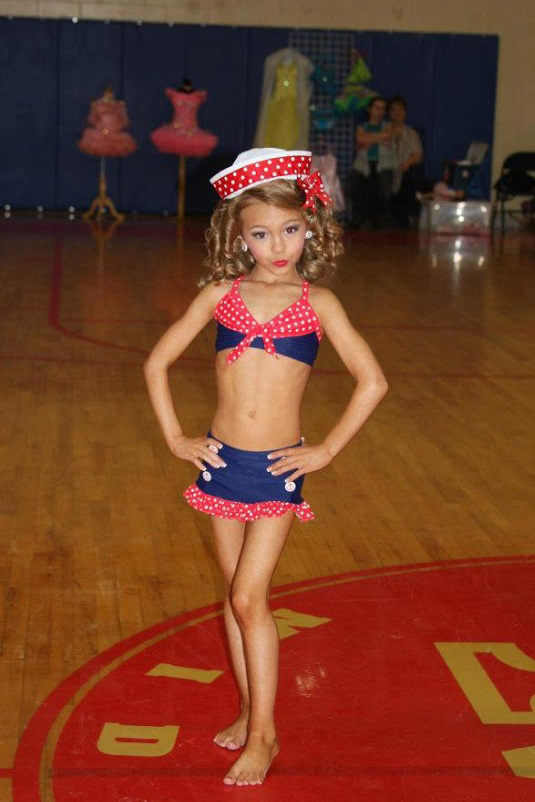
Debbie Williams Tyra
Hannah Stark, 13, is a star of Lifetime’s “Kim of Queens.” “Being on TV helped me open up more,” she said.
It’s the annual Queen of Hearts Beauty Pageant in Statesboro, Ga., and 3-year-old Paisley’s mom, Wendy Dickey, has the perfect costume for her. Paisley walks onstage wearing a blue miniskirt, a white tank top, high black boots and a blonde wig.
Paisley is doing a “Pretty Woman” routine, a number based on an R-rated flick about prostitution. As she struts her stuff on stage, the judges and audience go crazy. Pretty Woman Paisley wins the pageant, beating children dressed in more modest outfits, such as a Shirley Temple costume.
And it all aired on the TLC television series “Toddlers & Tiaras.”
Incidents like this raise questions about the exploitation of children through reality shows, especially those that involve beauty pageants.
“What is the long-term impact of participation in child pageants that may sexualize girls at such a young age, and certainly do focus on physical appearance? We all suspect negative impacts on self-esteem, an increase in eating disorders and an obsession with perfection — but the truth is that we simply don’t know,” said Hilary Levey Friedman, a sociologist who writes about children in beauty pageants and reality television and is an affiliate of the Malcolm Wiener Center for Social Policy at the Harvard Kennedy School of Government.
The issue has resurfaced repeatedly, most recently with news of “Dance Moms,” a show known for its overly involved moms and even more intense dance teacher. Fox News reported that Paige Hyland, a child formerly on the show, claimed her dance instructor Abby Lee Miller “intentionally engaged in conduct that caused Plaintiff Paige Hyland to reasonably believe that she was about to be touched or harmed in an offensive manner.” Hyland alleges she suffered emotional abuse, and developed panic attacks and anxiety from the actions of her reality-star dance instructor Miller.
Should Children Be on Reality Shows?

Debbie Williams Tyra
Hannah was eight years old when she competed in her first beauty pageant. Her teacher suggested she try pageants to get over her shyness, according to her mother.
Whether or not it is ethical for children to be on reality shows has been contested for years, and the debate has fed the ratings. “Kim of Queens” on Lifetime, a pageant coaching show, has run for two seasons while, prior to its cancellation, “Here Comes Honey Boo Boo” set record highs in network ratings.
Although no longer on the air, “Toddlers & Tiaras” was what first gave us a glimpse into this niche world of the antics behind beauty pageants, such as the scene described above.
“We were doing a celebrity pageant and chose Julia Roberts because I’m a huge fan of hers and she is from Georgia also,” Wendy Dickey told Fox News in mid-November. “I was trying to be funny.” Paisley is now 6.
And it worked, if the audience and judges’ laughter was any indication. Nobody came up to Dickey that day at the pageant criticizing her for dressing her child in that outfit, and her daughter did indeed win the crown.
It was only later that criticism came flying out of the woodwork, with Dickey even receiving death threats, according to the Daily Mail newspaper.
“Within that world, they are just seen as ‘cute,’ not sexual, and are what you must do in order to win the biggest crown,” Friedman explained. “They are just moves. But that shared understanding in the pageant ballroom isn’t present in the wider world, and once these routines are broadcast to a wider audience, they are rightly seen as having sexual elements in them — batting eyelashes, blowing kisses and thrusting hips. Which is why allowing young children to be on these television shows is problematic.”
A Coming-of-Age Experience
But what is it like for a child and her mother to be in a beauty-pageant reality show that revolves around their lives?
“It kind of feels like you’re flying,” said Debbie Williams Tyra, a cast member of the TV show “Kim of Queens” and mother of 13-year-old Hannah Stark. “I get nervous because I am so protective, but Hannah is so reserved and so nice to the fans.”
Stark competed in her first beauty pageant at age 8 and since then been in multiple pageants. Tyra says Stark was very shy and her teacher suggested putting her in a pageant so that she would talk more. However, Stark understood the concept of pageantry.
“You can be pretty onstage and look much older and act older than you are in real life, but offstage you’re just the same person,” Stark said.
This concept may be difficult for young girls who are not as mature as Stark is to understand, Tyra said.
Critics say pageants promote beauty on the outside rather than the inside.
“For me, I think beauty does come from within, but it’s called a beauty pageant so you have to kind of be beautiful,” Tyra said.
Beauty is not the determining factor in who wins a crown, according to Amanda Smith Vogel, pageant consultant, owner of Sash and Crown Consulting and former Miss Georgia USA.
“When I judge a child under the age of 12, personality plays a huge role in what I look for in awarding a crown,” she said. “If I sense a child is uncomfortable onstage and likely participating in the pageant because a parent has pushed her to be there, I score her very low, hoping the pushy parent will get a clue and remove the child from the uncomfortable situation.”
Stark’s pageant coach and “Kim of Queens” co-star Kim Gravel says, “The world promotes beauty on the outside and pageants are no different … I believe everyone is beautiful and has a unique look, walk, talk and presence about them. Most people just need a little guidance to see it in themselves. My goal is to break the stereotypical mold of what is beautiful and help each girl I coach to see their individuality.”
According to “Kim of Queens” executive producer Oliver Bogner, Gravel was “born to be on television.” Her desire to sing and perform was what drew her to pageantry, he said.
“When I was young, we did not have the talent outlets that young people have today like ‘American Idol’ or ‘The Voice,’ ” added Gravel. “Pageants were a way to showcase talent and pay for college.”
Gravel never thought she would be a pageant coach. Still, she trained dozens of young women, not for money or as a business, but more out of duty to “pay it forward.”
“My sole reason for training girls has nothing to do with pageants and everything to do with developing productive young leaders with strong points of view,” she said.
This is the premise of her show, which is praised for its positive messages. Each week shows Gravel transforming a not-so-girly girl into a beauty pageant queen. Gravel also spends time coaching her seasoned pageant pros, including Stark, Addison Wingate and Marah Collins.
Gravel uses a unique coaching style to help the girls feel comfortable enough to reveal themselves.
In a recent episode, for example, Stark revealed that she had struggled with an eating disorder, which shocked many family members and friends. But “being on TV helped me open up more,” Stark said. “We never told anyone about my eating disorder besides close family and friends. I think that growing up with anorexia people can relate to and I hope I can help others.”
How Real Is Reality Television?

Andrea Phillips
Nine-year-old star of TLC’s “Toddlers & Tiaras” Jayla Phillips strikes a pose for the camera.
While some may argue that producers force reality television stars to make these sorts of confessions to drive up ratings and create drama for the show, Bogner says this is not true.
“Nobody is forcing the girls to do anything,” Bogner said. “Kim gets them to open up to her because of the loving person that she is.”
Tom Rogan, executive producer of “Toddlers & Tiaras” and “Here Comes Honey Boo Boo,” also agrees that his team does not create drama just for the sake of creating drama.
“I definitely feel the show [“Toddlers & Tiaras”] portrayed everything that happened out there in an accurate way,” he said.
Jayla Phillips and her mother Andrea, cast on the show “Toddlers & Tiaras,” say they overall had a positive experience.
“Jayla wanted to be on TV. A lot of that show is drama and I’ve never been one of those types of pageant moms but it had gotten where later in the season they would have one crazy mom and one bad kid and a normal person thrown in there and I guess we were considered the normal people,” Phillips said.
That doesn’t mean she felt all was portrayed accurately. Just as Dickey complained of the show’s strategic editing, she pointed to certain nuances she’d observed on-screen. “I felt like I was normal on the show but Jayla, they made her look way more shy than what she has ever been,” Phillips said. “I read on the Internet that someone said that I probably made her do pageants and she hated pageants, which is very far from the truth.”
Similarly, Leeann Greene Busby said she and her daughter “were portrayed as losers, not winners on ‘Kim of Queens.’ ”
“My daughter had never lost a pageant until the show,” she said.
Psychological Effects of the Child Pageant World
Many who participate in pageants consider it similar to competing in a sport. But there may be some negative consequences.
According to Friedman, “One study that looked at a small group of former child-beauty-pageant contestants in young adulthood found that they have higher rates of body dissatisfaction, but don’t have more serious problems like depression and eating disorders. We need more of this research, though, before using participation in pageants as a basis to judge parenting, or, in the extreme, alter family dynamics.”
Critics have suggested removing the shows from the air altogether. Rogan insisted this is not the answer, saying that most of the complaints stemmed from issues with the pageant world itself or with the parenting styles displayed.
“If you disagree with the fact that these pageants exist, or you feel it should be done differently, then you can take the hard route and figure out why this is happening and what is it about our culture that has given rise to this,” he said. “As opposed to saying, this show is terrible, take it off the air.”
Despite the controversy, none of the girls plan to stop competing in pageants anytime soon. Both Rogan and Bogner say they would allow their children or future children to compete in pageants.
“Pageants are simply a sport and I’m not sure why the world is so scared of outward beauty when that’s all advertisers, fashion industry and now even TV commercials perpetuate,” Gravel said. “Look, I’m not a fan of all pageants or even think they are for all people. But I will say you can use them for self-improvement, scholarship money and to learn how to speak! Pageants, for me, were a means to an end. Look, I’m sitting here today with a TV show trying to help young women discover their God-given calling, all because of a pageant. So they can’t be all that bad, can they?”
This story first appeared in somewhat different form in Neon Tommy.


























